
he enigmatic circumstances of Vesalius' journey to Jerusalem and subsequent death on the Greek island of Zante (Zakynthos), on what would have been his return trip to Europe, inspired American writer Edith Wharton to pen this poem. She contemplates Vesalius' last thoughts from his deathbed. His reveries in the poem range from his infamous autopsy on a woman who was unexpectedly still alive, to his rival Fallopius, and to their historical predecessor the great anatomist Galen.
By Edith Wharton (1862-1937)
Vesalius In Zante
Set wide the window.
Let me drink the day.
I loved light ever, light in eye and brain—
No tapers mirrored in long palace floors,
Nor dedicated depths of silent aisles,
But just the common dusty wind-blown day
That roofs earth’s millions.
O, too long I walked
In that thrice-sifted air that princes breathe,
Nor felt the heaven-wide jostling of the winds
And all the ancient outlawry of earth!
Now let me breathe and see.
This pilgrimage
They call a penance—let them call it that!
I set my face to the East to shrive my soul
Of mortal sin? So be it. If my blade
Once questioned living flesh, if once I tore
The pages of the Book in opening it,
See what the torn page yielded ere the light
Had paled its buried characters—and judge!
The girl they brought me, pinioned hand and foot
In catalepsy—say I should have known
That trance had not yet darkened into death,
And held my scalpel. Well, suppose I knew?
Sum up the facts—her life against her death.
Her life? The scum upon the pools of pleasure
Breeds such by thousands. And her death? Perchance
The obolus to appease the ferrying Shade,
And waft her into immortality.
Think what she purchased with that one heart-flutter
That whispered its deep secret to my blade!
For, just because her bosom fluttered still,
It told me more than many rifled graves;
Because I spoke too soon, she answered me,
Her vain life ripened to this bud of death
As the whole plant is forced into one flower,
All her blank past a scroll on which God wrote
His word of healing—so that the poor flesh,
Which spread death living, died to purchase life!
Ah, no! The sin I sinned was mine, not theirs.
Not that they sent me forth to wash away—
None of their tariffed frailties, but a deed
So far beyond their grasp of good or ill
That, set to weigh it in the Church’s balance,
Scarce would they know which scale to cast it in.
But I, I know. I sinned against my will,
Myself, my soul—the God within the breast:
Can any penance wash such sacrilege?
When I was young in Venice, years ago,
I walked the hospice with a Spanish monk,
A solitary cloistered in high thoughts,
The great Loyola, whom I reckoned then
A mere refurbisher of faded creeds,
Expert to edge anew the arms of faith,
As who should say, a Galenist, resolved
To hold the walls of dogma against fact,
Experience, insight, his own self, if need be!
Ah, how I pitied him, mine own eyes set
Straight in the level beams of Truth, who groped
In error’s old deserted catacombs
And lit his tapers upon empty graves!
Ay, but he held his own, the monk—more man
Than any laurelled cripple of the wars,
Charles’s spent shafts; for what he willed he willed,
As those do that forerun the wheels of fate,
Not take their dust—that force the virgin hours,
Hew life into the likeness of themselves
And wrest the stars from their concurrences.
So firm his mould; but mine the ductile soul
That wears the livery of circumstance
And hangs obsequious on its suzerain’s eye.
For who rules now? The twilight-flitting monk,
Or I, that took the morning like an Alp?
He held his own, I let mine slip from me,
The birthright that no sovereign can restore;
And so ironic Time beholds us now
Master and slave—he lord of half the earth,
I ousted from my narrow heritage.
For there’s the sting! My kingdom knows me not.
Reach me that folio—my usurper’s title!
Fallopius reigning, vice—nay, not so:
Successor, not usurper. I am dead.
My throne stood empty; he was heir to it.
Ay, but who hewed his kingdom from the waste,
Cleared, inch by inch, the acres for his sowing,
Won back for man that ancient fief o’ the Church,
His body? Who flung Galen from his seat,
And founded the great dynasty of truth
In error’s central kingdom?Ask men that,
And see their answer: just a wondering stare
To learn things were not always as they are—
The very fight forgotten with the fighter;
Already grows the moss upon my grave!
Ay, and so meet—hold fast to that, Vesalius.
They only, who re-conquer day by day
The inch of ground they camped on over-night,
Have right of foothold on this crowded earth.
I left mine own; he seized it; with it went
My name, my fame, my very self, it seems,
Till I am but the symbol of a man,
The sign-board creaking o’er an empty inn.
He names me—true! Oh, give the door its due
I entered by. Only, I pray you, note,
Had door been none, a shoulder-thrust of mine
Had breached the crazy wall”—he seems to say.
So meet—and yet a word of thanks, of praise,
Of recognition that the clue was found,
Seized, followed, clung to, by some hand now dust—
Had this obscured his quartering of my shield?
How the one weakness stirs again! I thought
I had done with that old thirst for gratitude
That lured me to the desert years ago.
I did my work—and was not that enough?
No; but because the idlers sneered and shrugged,
The envious whispered, the traducers lied,
And friendship doubted where it should have cheered
I flung aside the unfinished task, sought praise
Outside my soul’s esteem, and learned too late
That victory, like God’s kingdom, is within.
(Nay, let the folio rest upon my knee.
I do not feel its weight.) Ingratitude?
The hurrying traveller does not ask the name
Of him who points him on his way; and this
Fallopius sits in the mid-heart of me,
Because he keeps his eye upon the goal,
Cuts a straight furrow to the end in view,
Cares not who oped the fountain by the way,
But drinks to draw fresh courage for his journey.
That was the lesson that Ignatius taught—
The one I might have learned from him, but would not—
That we are but stray atoms on the wind,
A dancing transiency of summer eves,
Till we become one with our purpose, merged
In that vast effort of the race which makes
Mortality immortal.
“He that losethHis life shall find it”: so the Scripture runs.
But I so hugged the fleeting self in me,
So loved the lovely perishable hours,
So kissed myself to death upon their lips,
That on one pyre we perished in the end—
A grimmer bonfire than the Church e’er lit!
Yet all was well—or seemed so—till I heard
That younger voice, an echo of my own,
And, like a wanderer turning to his home,
Who finds another on the hearth, and learns,
Half-dazed, that other is his actual self
In name and claim, as the whole parish swears,
So strangely, suddenly, stood dispossessed
Of that same self I had sold all to keep,
A baffled ghost that none would see or hear!
“Vesalius? Who’s Vesalius? This Fallopius
It is who dragged the Galen-idol down,
Who rent the veil of flesh and forced a way
Into the secret fortalice of life”—
Yet it was I that bore the brunt of it!
Well, better so! Better awake and live
My last brief moment as the man I was,
Than lapse from life’s long lethargy to death
Without one conscious interval. At least
I repossess my past, am once again
No courtier med’cining the whims of kings
In muffled palace-chambers, but the free
Friendless Vesalius, with his back to the wall
And all the world against him. O, for that
Best gift of all, Fallopius, take my thanks—
That, and much more. At first, when Padua wrote:
“Master, Fallopius dead, resume again
The chair even he could not completely fill,
And see what usury age shall take of youth
In honours forfeited”—why, just at first,
I was quite simply credulously glad
To think the old life stood ajar for me,
Like a fond woman’s unforgetting heart.
But now that death waylays me—now I know
This isle is the circumference of my days,
And I shall die here in a little while—
So also best, Fallopius!
For I see
The gods may give anew, but not restore;
And though I think that, in my chair again
,I might have argued my supplanters wrong
In this or that—this Cesalpinus, say,
With all his hot-foot blundering in the dark,
Fabricius, with his over-cautious clutch
On Galen (systole and diastole
Of Truth’s mysterious heart!)—yet, other ways,
It may be that this dying serves the cause.
For Truth stays not to build her monument
For this or that co-operating hand,
But props it with her servants’ failures—nay,
Cements its courses with their blood and brains,
A living substance that shall clinch her walls
Against the assaults of time. Already, see,
Her scaffold rises on my hidden toil,
I but the accepted premiss whence must spring
The airy structure of her argument;
Nor could the bricks it rests on serve to build
The crowning finials. I abide her law:
A different substance for a different end—
Content to know I hold the building up;
Though men, agape at dome and pinnacles,
Guess not, the whole must crumble like a dream
But for that buried labour underneath.
Yet, Padua, I had still my word to say!
Let others say it!—Ah, but will they guess
Just the one word—? Nay, Truth is many-tongued.
What one man failed to speak, another finds
Another word for. May not all converge
In some vast utterance, of which you and I,
Fallopius, were but halting syllables?
So knowledge come, no matter how it comes!
No matter whence the light falls, so it fall!
Truth’s way, not mine—that I, whose service failed
In action, yet may make amends in praise.
Fabricius, Cesalpinus, say your word,
Not yours, or mine, but Truth’s, as you receive it!
You miss a point I saw? See others, then!
Misread my meaning? Yet expound your own!
Obscure one space I cleared? The sky is wide,
And you may yet uncover other stars.
For thus I read the meaning of this end:
There are two ways of spreading light: to be
The candle or the mirror that reflects it.
I let my wick burn out—there yet remains
To spread an answering surface to the flame
That others kindle.
Turn me in my bed.
The window darkens as the hours swing round;
But yonder, look the other casement glows!
Let me face westward as my sun goes down.
